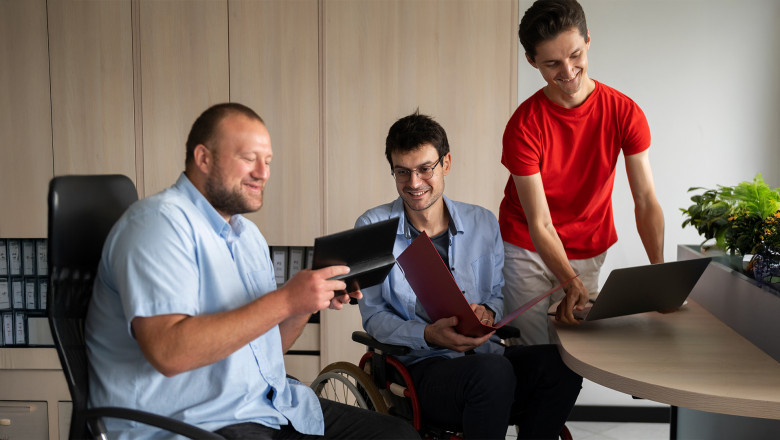views
You deserve to be heard. You deserve support that works for you.
Reach out for help today.
When I first heard about the NDIS, I thought it was only for people with visible disabilities and not someone like me. I come from a migrant family, and mental health isn’t something we talk about openly. But then again, is it something any of us can talk about openly? I doubt it.
Growing up, I always felt like I had to stay quiet and just push through everything. But after high school, things got worse. The pressure to “do something” with my life was overwhelming. Between studying and working multiple jobs to support myself and my family, I was juggling a lot, and eventually, things started to fall apart. It felt like the inevitable result of something I’d been ignoring for too long. I was constantly anxious, but I had no idea how to ask for help without seeming weak or ungrateful. I knew others had it worse, and the last thing I wanted was to come across as an attention seeker or someone trying to create drama.
Talking about it at home also wasn’t an option. There’s so much stigma, so much shame. And for someone like me who is already trying to balance two cultures, this just felt like another impossible weight to carry.
How I Got Rejected the First Time I Tried to Apply for NDIS
After days of overthinking and overanalysing, I finally resolved one of my biggest internal conflicts: whether or not to seek help. Eventually, I decided it might be better for me. But when I finally found the courage to apply for the NDIS, I hit another wall. I’d been so hyper-independent for so long that I didn’t even know how to explain what I was going through.
I even struggled with the forms, just getting the “right” documents and figuring out the “right” words to use; all of it seemed daunting. It honestly made me feel like the system wasn’t built for people like me, people who speak a second language or who don’t have someone to advocate for them.
And as expected, my application got rejected. I mean, a part of me still hoped that things would work out and that if I could just get through this one thing, maybe I’d finally have it all under control. I’m not going to lie, the rejection hit me hard. They said my condition didn’t meet the criteria, and at that moment, I even believed it. I thought maybe someone else out there needed the help more than me. But logic aside, I couldn’t shake the feeling. I felt like a failure. All over again.
My Journey With FLIP
After that rejection, I wasn’t exactly rushing to ask for help again.
I felt defeated, like the system had spoken, and maybe it was right. Maybe I just wasn’t “disabled enough” or didn’t tick the right boxes.
But deep down, that feeling of needing support never really left. It lingered quietly in the background. And every time I tried to ignore it, it just got louder. A few weeks later, at a local community event, I ended up in a random chat with a youth support worker. I didn’t expect much because I’d heard the same advice before and was honestly over it.
But this time, they mentioned FLIP’s personalised support service, and they said it was different. I was hesitant at first; I'd been disappointed before and didn't want to get my expectations up again. Still, something inside me pushed me to give it a go. So I sent a message through their website. To my surprise, I got a reply pretty quickly. And from the very first conversation, I felt something I hadn’t felt in a long time: understood.
How FLIP helped me
What stood out to me was how relaxed and real the support felt. No complicated language. No pressure to “prove” anything. They explained everything in a way that made sense, even with my parents, who were nervous about the whole thing.
They helped me prepare for my NDIS review. They gave me tips, walked me through the entire process, and helped me express my anxiety and deal with how it affected my everyday life. This time, my application was approved.
What Changed After That?
It wasn’t some magic fix that changed everything overnight, but for the first time in a long time, I had the support and guidance I’d been needing for so long. They helped me build the confidence to join a youth group, where I met others going through similar stuff. That sense of community also made a huge difference.
Just a few months ago, I couldn’t even sit through a job interview without having a panic attack halfway through. Now, I’m earning my own money, covering my expenses, and even thinking about starting a course next year.
Why FLIP Worked for Me
-
They respected my culture and didn’t judge me.
-
They spoke to me, not just to my parents.
-
They explained the NDIS in a way I could understand.
-
They believed in my goals, even the small ones.
-
I never felt like I had to hide who I was.
And honestly, all these little things made the most prominent difference.
If you’re from a culturally diverse background and struggling, let me tell you that you’re not alone.
I know how hard it is to ask for help, especially when your family or community might not fully get what you’re going through. But that doesn’t make your struggle any less valid. If your mind’s been quietly telling you that something’s not right and that you might need support, please, listen to that voice. Those instincts are usually spot-on. FLIP’s personalised support helped me take back control of my life without changing who I am or where I come from.






















Comments
0 comment